I’m okay.
This week was a rough one, I won’t lie. I went from frantically checking on all my close friends (sorry, not sorry), to lying all day in a crying stupor, to working out so hard I might have busted my right knee a smidge, to spending the day on the couch binge-ing on junk food and binge-watching Netflix. Just when I think I’m getting over the shock of Shanna being physically gone, I am slapped sobbing with loss again. It comes out of nowhere and there’s really no warning what will set me off—standing in the kitchen cooking and boom, blubbering mess. I’ve stopped trying to make sense of any of it. That’s all just a futile waste of time. I’m taking comfort in the imagination that every time I cry over her, she’s there with me and can see me and says the things she always said when life was shitty. Calls me Baby Doll or Buttercup. All those things my non-binary feminist brain would cringe at were it coming from anyone else. She says, “I know, I know. Let it out, Bunny-boo.”
I hope you were able to buy her book or put it on hold at your library. It really is an amazing novel.
I have to confess that I’m finding myself reluctant to getting back to talking about French stuff from a silly American perspective. Maybe what I need is to talk about deeper things. Political things. Maybe racism and homophobia and religion, etc. Maybe I will. Maybe if those are the things you want to know more about, you should leave me a little comment here or shoot me a message saying, “Yes, joj. Tell us more about the dirt.”
Les Courses
Yes, France is the land of the French Fry (actually, there’s a whole sordid history on that (possible) misnomer which you can read about HERE (IN ENGLISH)), but that’s just ONE thing they like to do to potatoes. Beyond the great things they like to make out of fresh potatoes—tartiflette, gratin dauphinois, hachis parmentier and just your basic purée—and the stuff they like to add potatoes to (raclette, fondue bourguignonne, choucroute and even pizza!!!), at the supermarket, you can find a wide variety of frozen (or otherwise processed) potatoes. In my freezer right now, I have pommes risolées (kind of like home fries), röstis (which are actually German hash brown patties), croquettes (puréed potatoes squished into tater tot-shaped morsels that have been pre-fried so you can heat them in the oven), pommes dauphines (similar to the croquettes but in a tiny sphere), and pommes duchesses (potato purée mixed with a bit of egg yolk and piped onto a sheet—I used to make these from scratch but the frozen ones are so much more convenient when you’re cranky and grieving). In the snacky/aperitif aisle, you can find shoe string potatoes, potato chips/crisps with weird flavors and even potatoes boiled, turned into a powder and put into ghost-shaped molds which are then fried and covered in ham-and-cheese-flavored powder (so, not food at all, quoi).
Here’s a little movie of the frozen potato section at our supermarket:
The two tater dishes we Americans like that surprise (in the first case) and disgust (in the second case) the French are our traditional baked potato (!!!) and New England Clam Chowder—go figure, the French don’t like clams and the idea of mixing potatoes with seafood and cream in a soup makes them look at you like you have a cupcake growing out of your head.
If you’d like more facts and history about the potato and its origins (hint: It ain’t French OR North American), HERE and HERE (BOTH IN ENGLISH).
Parlez-vous?
Les Faux Amis
Though French and English are from different branches of language (French is originally latinate and English is Germanic), they evolved (and are still evolving) together and have become somewhat linguistically incestuous. There are a LOT of English words in French—too many for me to try to name—and just about any word ending in -tion in English can thank French (and its parent Latin) for its existence.
But there are words that, though they might logically seem like they should mean the same thing, they do not. These are called “false friends” in English and des faux amis in French. Some are strikingly different and have NOTHING to do with each other—like library (bibliothèque in French) vs. librarie (book store in English), or cave (grotte in French) vs. cave (wine celler in English). A car in French is a big tour bus. A location in French is not a spot on a map, but a rental. A command is an order, still, but not like “go to your room” but like a menu order (commander is the verb for to order). A déception is a disappointment, not a lie. Blessé does not mean blessed but wounded. If you compliment someone in French as being sensible because you think they are rational, you’ve actually just told them that they are sensitive and probably sound a little patronizing. If you tell someone you haven’t gotten the chance because you mean you haven’t had the opportunity, you’ve actually told them you didn’t have any luck.
Others are more about nuance. For example, a lot of Americans rely on the word “actually” to express the sentiment, “in fact,” but the word actuellement in French means “happening right now.” Using the word “eventually” means that something will probably end up happening, that it’s planned and mostly sure, but the French eventuellement has way less certainty and is more like “we’ll see” or “maybe.” There are an annoyingly high number of these faux amis.
Other false friends can be downright embarrassing—I remember when my grandfather asked The Hairy One (THO) back when he was my new boyfriend, if the reason French bread gets hard so quickly is because there are fewer preservatives. You’d think that would be a harmless question. But préservatifs is the French word for condoms. And don’t get me started on the word douche. HERE is a list of 85 common false friends you may be interested to know about. The one NOT listed on that link is one that comes up almost DAILY in our household:
Normalement vs. Normally—Normally means usually, something habitual. As in, “normally, I’m able to find pre-cut hot dog buns at Auchan.” But, normalement means “if all goes as planned or as normal.” It’s pretty definite but leaves room for Murphy’s Law. This one gets us into some pickles when we’re sitting at the breakfast table trying to plan things out because it depends on who says it and the language they’re using. (To be honest, it’s almost ALWAYS THO using it incorrectly in English that stirs up confusion.)
Words for the Place Where You, Ahem, RELIEVE Yourself (you’ll see why in a minute)
This is one of those possibly embarrassing faux amis. You’ve probably heard that the word for the place you go to pee and poop is called les toilettes in France*, but that’s not entirely accurate. Yes, saying, “Où sont/se trouvent les toilettes?” will get you to a toilet, but many times in public, this is called the W.C. (which stands for Water Closet) but please note that very few people SAY W.C. (doo-bluh veh-seh) but shorten it to sound like V.C. (veh-seh). So, toilet and W.C. work to get you to the room you’re looking for. However, there are other more familiar ways of talking about it:
Les chiottes—this literally means the shitter, so, it’s SUPER familiar. BEWARE.
Le p’tit coin—this literally means the little corner. It’s polite and kind of cute.
Le pipi room—this is obvious. Also polite and cute and young adult.
Les latrines—same as in English.
Le thrône—the throne, like in English.
HERE (IN FRENCH) is a link to a list of others.
HERE (IN FRENCH) are some creative ways of saying you’re going to go take a poop.
The place where you sit, that we call A TOILET in English is la cuvette (this is actually the toilet bowl, but it’ll work).
A urinal is a urinoir but also a pissoir
* Though we call it a “bath room” or “rest room” in English, the same is not true in France. In most houses (though less and less in newer constructions), the toilet closet (or water closet or W.C.) is separate from where you take a bath. If you ask where the salle de bain is (the bath room), you’ll be expected to take a bath.
Tiny Annoying Differences
I’m not going to go on and on about it because I’m glad it exists at all, but y’all? Bacon.
When I first got to France back in the late 90s it was impossible to find bacon at all. There was “bacon” but it was more like Canadian bacon. There were a million (exaggeration) thinly sliced cured meats like pancetta, etc. and thankfully, there were/are lardons which are fantastic and delicious and can be added to just about ANYTHING to make it taste yummier, but you know how it is when you just want to bite down into a slice of bacon (I mean, if you’re a carni/omnivore), right?
Well, when I came back to France in the late aughts, I finally found they had something similar to American bacon called poitrine tranches fines which literally means thinly sliced breast. It comes in nature or fumé (smoked), but I prefer the nature one. It has similar flavor to American bacon, but I haven’t found any so far that isn’t way too thinly sliced. If you’re lucky, you get a fatty batch that is good at sticking together long enough to get it into the frying pan (or on a cookie sheet). But, if you’re unlucky, the pieces tear as you peel them from their neighbors. And you never know what you’re going to get until you open it and start messing with it.
I’m not complaining. I’m just saying. It works when you want bacon but it’s just not like HOME bacon is all.
Weird French Sh!t
This one might fall under Tiny Annoying Differences but it’s annoying enough to me that I push it over into Weird French Sh!t—and I wonder if it might just be Weird Everywhere-Else-But-the-USA Sh!t since I’ve seen this all over Europe (and maybe the UK, too, but I can’t remember).
Bathroom brushes. We have these in the States, yes, but in my part of the country, the brushes were to be used exclusively by the hosts of a restroom, not the guests or clients. In France, most private (and many public) restrooms have a toilet brush in them. Don’t ignore these and think they are there as a convenience for the custodian (well, indirectly, I guess, they are). These brushes are there for YOU to clean up after yourself. I’ll spare you the TMI and let you use your own imaginations—basically, if you make a mess when using the toilet, you are expected to be courteous and use the brush. Cool, huh? That way, if you’re the host, your job is easier when you go to clean the john, right? Except, because your visitor didn’t use any kind of disinfecting product, that brush now carries the remnants of their solid whatevers that they put right back into the little receptacle that holds the brush, eventually (the American eventually) leaving behind a sort of—I apologize in advance—poop soup for you to clean up later!!! This is a constant point of conflict in our home. THO was probably raised to think using the brush this was is courteous, so, it’s a reflex for him. But for ME, who has to clean up this poop soup periodically (‘cause, y’all, there’s no way around it when things start to get stinky), it is NOT courteous. I shit you not (hyuk, hyuk), I have even just ended up throwing some of them away (read: responsibly recycling them) before.
Now that you’re armed with this information, I’ll leave you to make your own choices when traveling (and toileting) in France. But if you happen to be hanging out at the jojdom compound, the truly courteous thing to do is just let me clean my own john, please and thanks.
Merci.
Thank you for reading me. And thanks for your patience as I work through my grief and try to find my way back to bitching and moaning about stupid little things in France. I hope y’all know that, overall, I’m a pretty optimistic, positive and happy person. I’ll pull out of it once I get to the other side of this tunnel. Thanks for stickin’ with me.

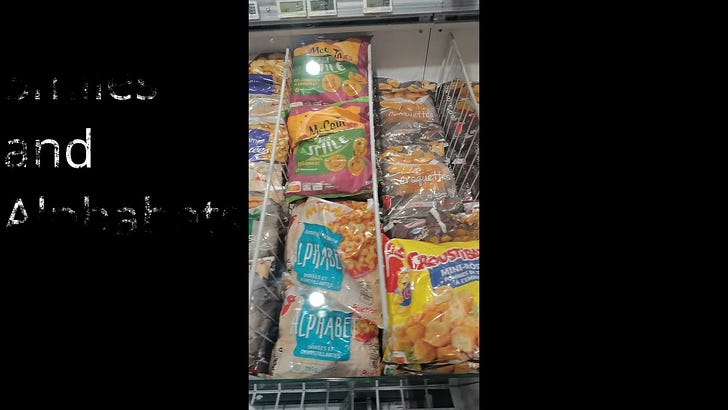

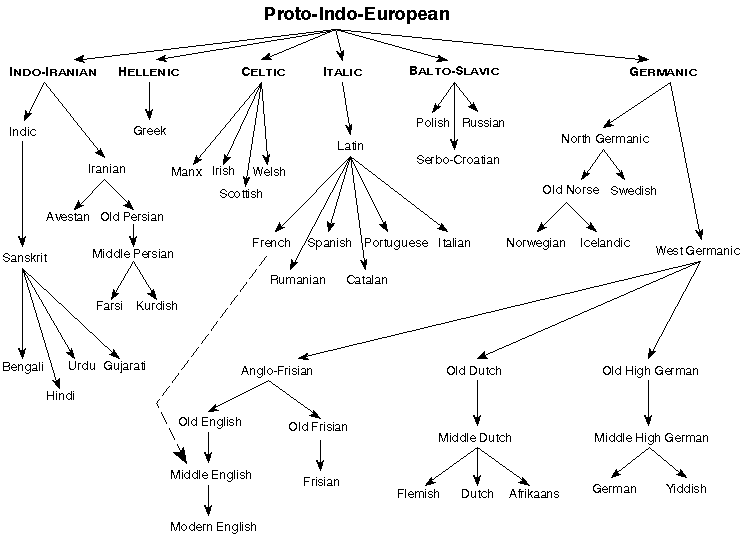

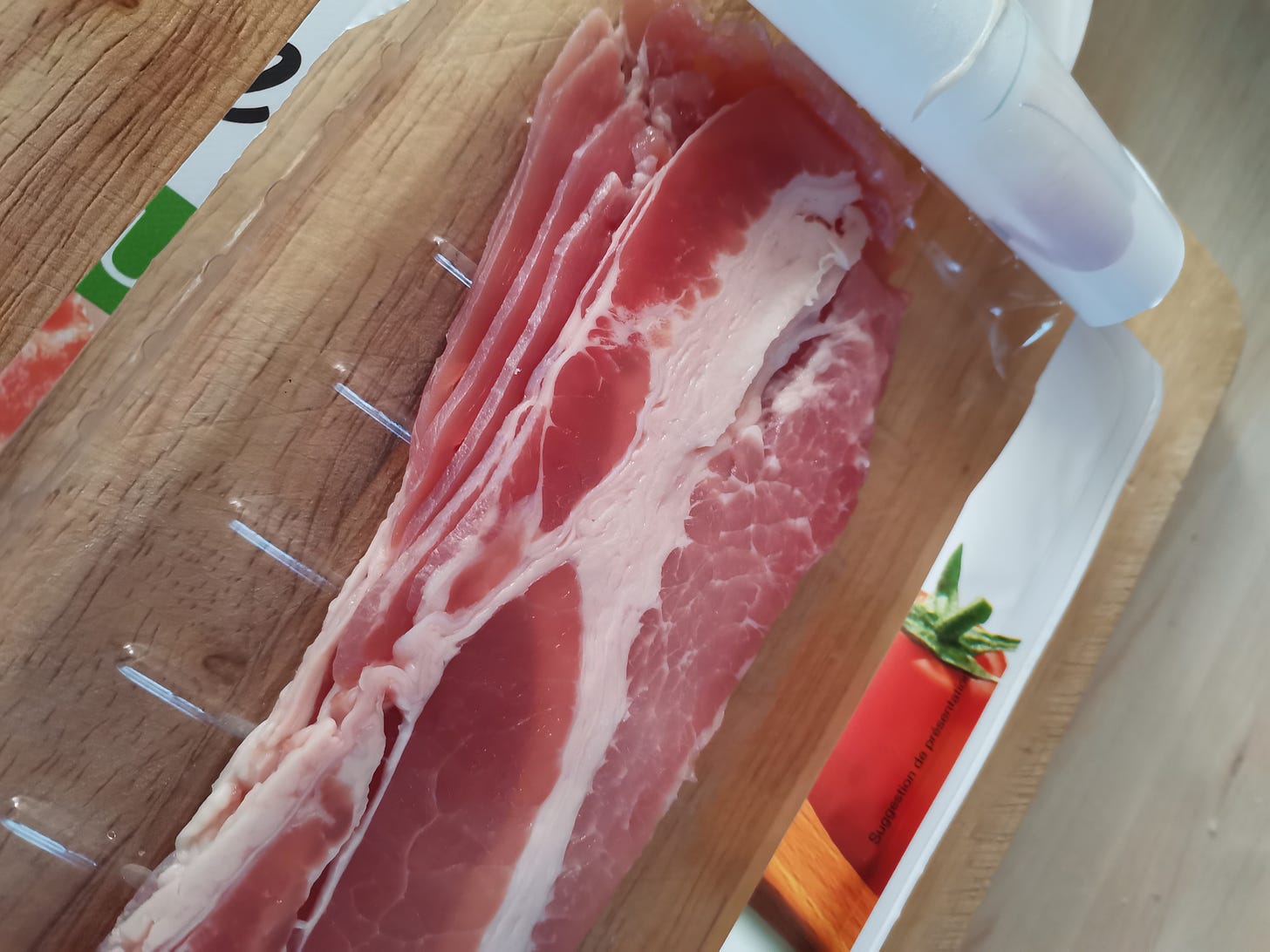
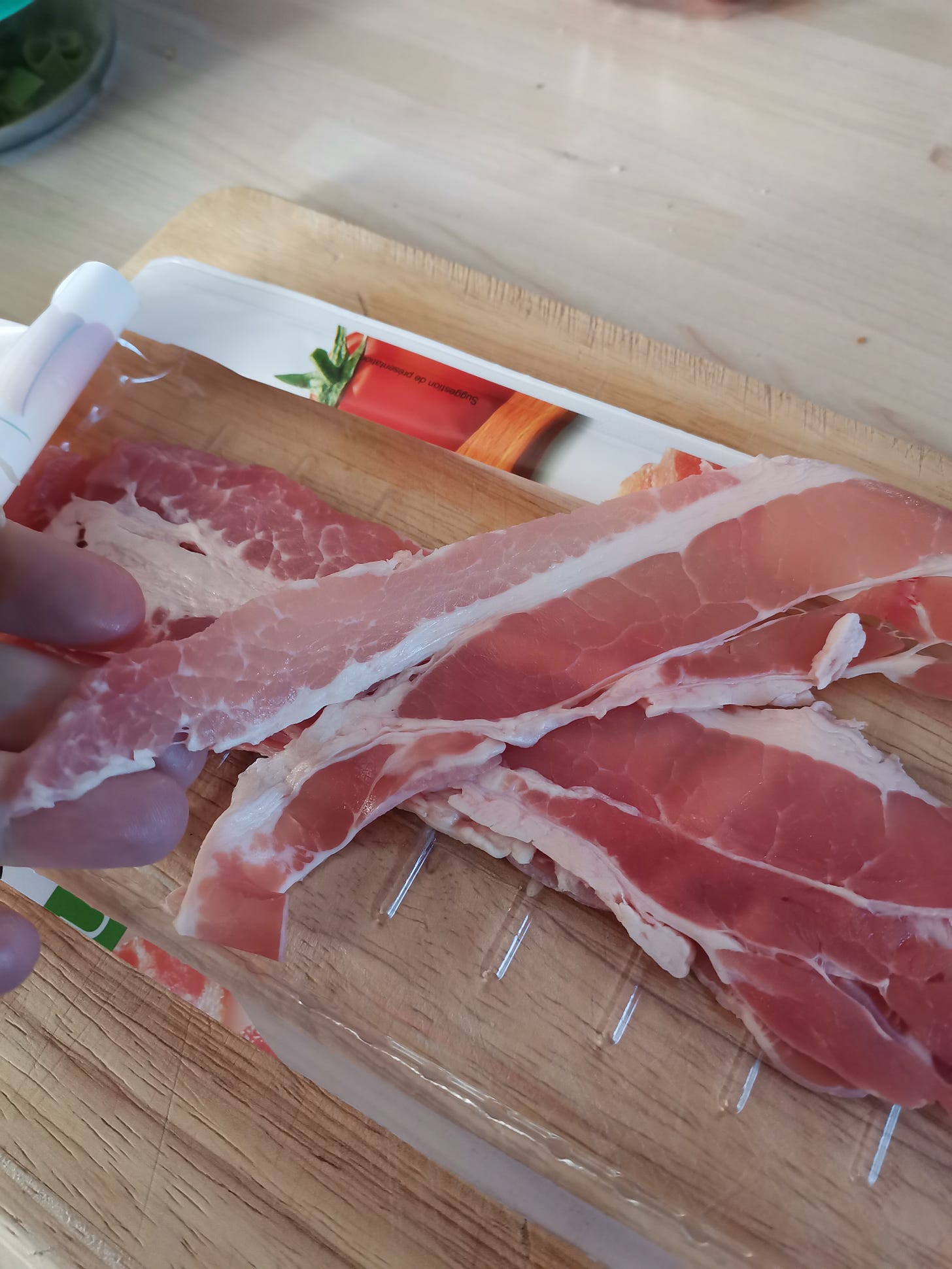
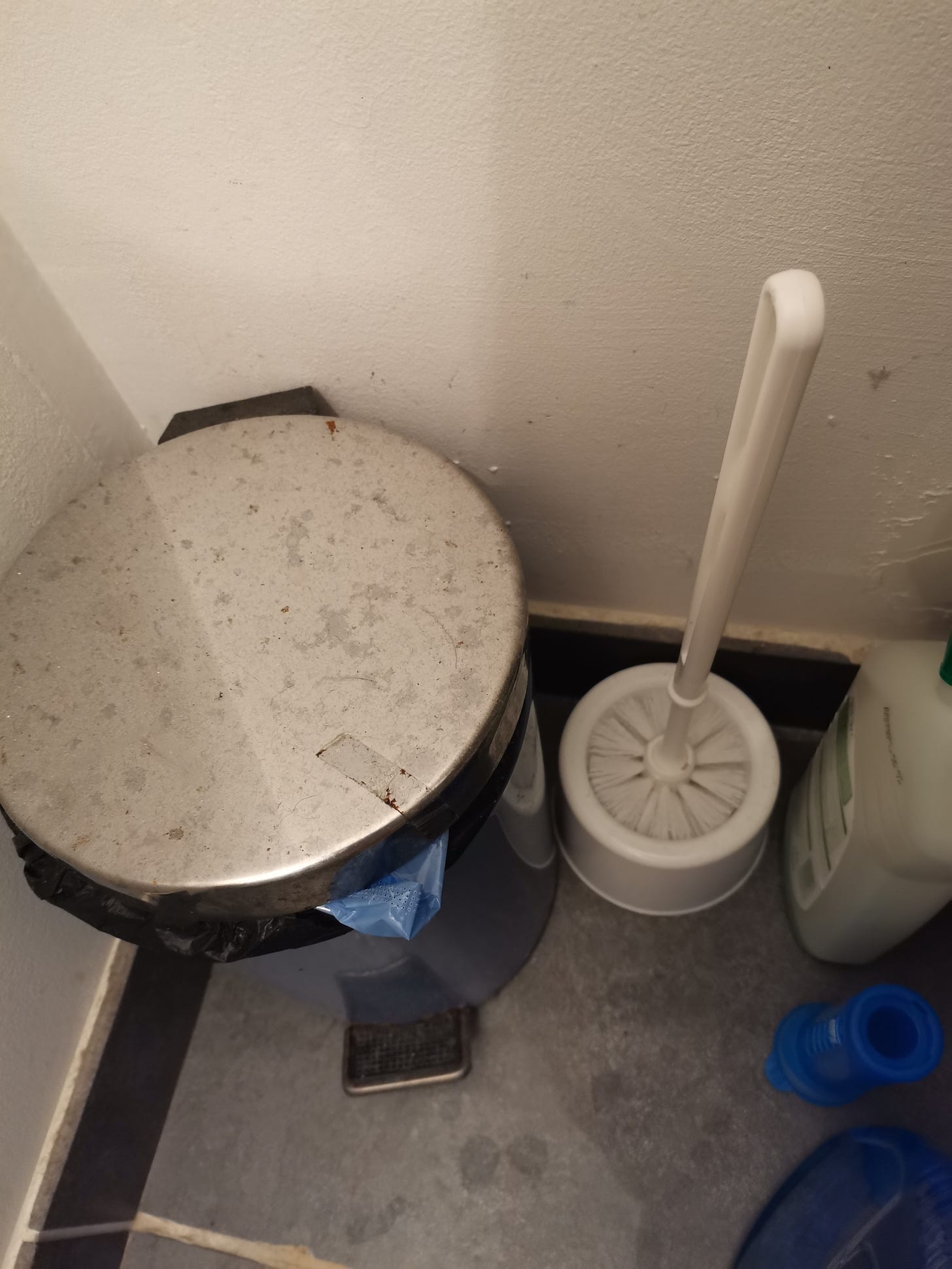
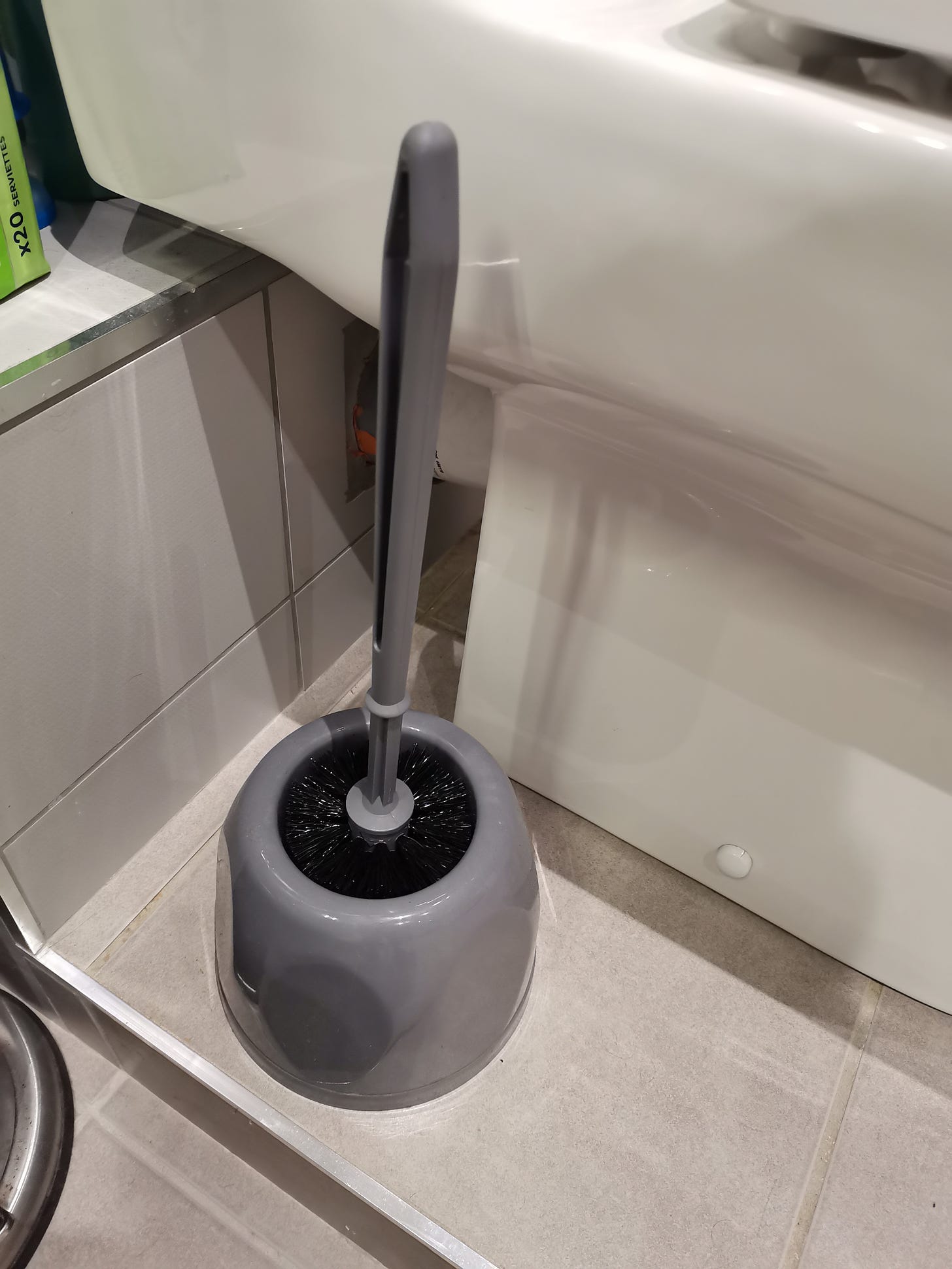
You had me at potato. Hang in there sweets. Big hug.
A big hug from pappy